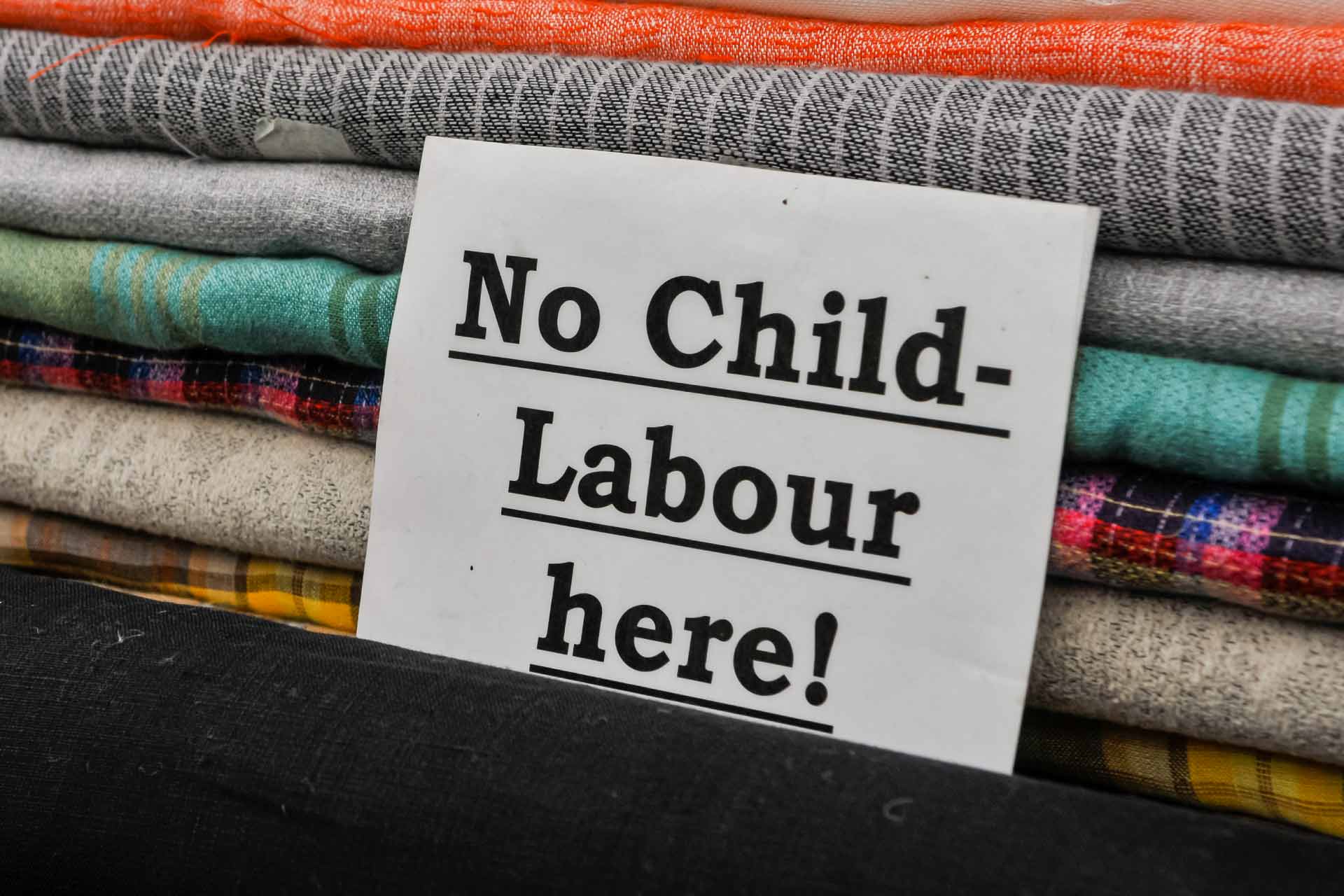
Professor Jo Meehan and Dr Bruce Pinnington explore the questions: what do businesses say they do to tackle modern slavery in their supply chains... and what can we learn from what they don’t say?
Research led by experts at the Centre for Sustainable Business (CSB), finds ambiguous language is often used by businesses to avoid taking timely action on modern slavery in their supply chains.
The study identifies ‘defensive reassurance’, ‘transferring responsibility’ and ‘scope reduction’ as the three main ways in which firms use ambiguous language.
With only 5% of firms analysed demonstrating sufficient progress, most corporate statements lack detail, evidence, and imply symbolic gesturing rather than tangible action to assure human rights are protected at all points in supply chains.
The analysis illustrates how firms use ambiguity in Transparency In Supply Chain (TISC) statements as a strategic form of action to defend the status quo, reduce accountability and delay action against modern slavery within supply chains.
Reporting of modern slavery in corporate supply chains, tick-boxing or tackling?
Although research into modern slavery in corporate supply chains is a new area for academic research, CSB Director Professor Jo Meehan and Dr Bruce Pinnington, an expert in slavery and unfree labour, have been spearheading research since 2017.
As part of their programme of research, their study Modern slavery in supply chains: insights through strategic ambiguity specifically focuses on finding out whether firms' TISC statements indicate that substantive action is being taken on modern slavery in UK government supply chains.
Modern slavery captures a range of violations that exploit people for the purposes of work or commercial gain. It includes human trafficking, forced labour, and debt bondage.
Latest global figures for 2021 estimate that 28 million people were in situations of forced labour, with numbers and risks rising year-on-year.
The UK Government’s Modern Slavery Act came into force in 2015, and includes a TISC provision (Section 54) that places an annual public reporting obligation on firms with a turnover of over £36m to report either:
- The steps taken to ensure slavery is not taking place in their operations and supply chains
- Confirmation that no action has been taken
Although the UK’s modern slavery’s TISC provision is a step in the right direction, it has faced wide criticism for mandating the publication of a statement, rather than mandating action, particularly as a business can still be legally compliant by stating it has made no steps to tackle modern slavery.
Despite genuine commitments to eliminating all forms of worker exploitation, anecdotal evidence from conversations with procurement professionals suggested a generalised perception that firms are just ‘ticking the box’.
In this respect, Governments not only set and enforce legislation, but are also powerful economic players which should lead by example by demonstrating best practice in their own commercial supply chains.
For instance, the UK Government’s Crown Commercial Service (CCS) brings together policy and advice, but also provides procurement services for the Central Government and over 18,000 organisations in the wider public sector, which amounted to £18.1billion of spend in 2019/20.
Understanding how Government suppliers respond to the challenge
In order to understand how government suppliers were responding to the modern slavery TISC legislation, the researcher team undertook qualitative systematic document analysis of:
- 20 key documents related to the policy intent of the UK Government’s, 2015 TISC requirements
- 66 of the UK government's strategic suppliers' TISC statements (1019 pages of text and 372,000 words from publicly available reports).
What is qualitative document analysis?
Qualitative document analysis is a qualitative research technique, which involves the systematic evaluation of electronic and physical documents to interpret them, gain an understanding of their meaning and develop upon the information they provide.
In the context of this research, qualitative document analysis was used to identify what the suppliers say they are doing and crucially, what they are not saying, to provide novel insights into how firms employ ambiguity to avoid timely action on modern slavery in their supply chains.
For the first set of data, the aim was to distil the primary policy intentions of the UK’s TISC legislation and identify what this implies for businesses, from documents generated between 2014-2019 by parliamentary and legislative bodies.
This included official Hansard records, related to the passing, implementation, and official reviews of the Modern Slavery Act and the Section 54 TISC provision.
The second dataset consisted of published modern slavery statements covering the period 2018-9, from a random sample of 66 of the UK government's strategic suppliers, drawn from a range of industries, including construction, IT, professional services, and travel.
Line-by-line analysis documented and classified what firms said they were doing to tackle modern slavery, and, more importantly, what they didn’t say through absences, implied exceptions, or assumptions.
For example, where firms stated they assessed modern slavery risks on their largest contracts, the inference is that smaller value contracts are left unchallenged.
From policy to practice: ambiguous language hides lack of action
TISC legislation and guidance are unambiguous in their aim: to tackle modern slavery, firms should work collaboratively across their supply chains to drive changes in practice.
TISC reporting aims to get businesses to respond to risks of modern slavery through demonstrating:
- Changes in business/procurement practice
- Accountability for workers throughout a firms’ supply chains.
So how were firms responding to these twin policy aims?
Unfortunately, the TISC statements analysed showed insufficient progress was being made on both counts, with only 5% of firms in the sample demonstrating sufficient action.
Statements lacked detail, evidence, and implied symbolic gesturing rather than tangible action to enable socially sustainable supply chains.
The researchers identified three ambiguous techniques: ‘defensive reassurance’, ‘transferring responsibility’ and ‘scope reduction’, that deviate from the policy intention of collaborative action.
Defensive reassurance
‘Defence reassurance’, is the attempt to convey an impression of best practice, but crucially without evidence or a specific focus on modern slavery, to establish trust and reassure stakeholders.
| No concerns relating to modern slavery were reported... or raised through audits |
|---|
| Example of reassuring statement reporting no concerns, but without supporting evidence |
This was the most common technique observed among the 66 companies, with many firms asserting no incidents of slavery have been found, and therefore concluding their processes are effective.
However, the lack of evidence and transparency of where, how and how hard they ‘looked’ was perhaps indicative of poor detection practices rather than effective supply chain controls.
| ... fully committed to ... the “Reform Programme” being developed by Electronics Watch |
|---|
| Example of reassuring by association through showing commitment to external initiatives |
| Companies ... by the Ethisphere Institute... recognised seven times by the Ethisphere Institute |
|---|
| Example of reassuring by highlighting awards and commendations, even though these are not necessarily related specifically to modern slavery |
Transferring responsibility
Firms use their commercial power to contractually transfer responsibility for tackling modern slavery to their suppliers, and in doing so, distance themselves from the issues, the risks, the solutions, and the causes.
While joint efforts from all supply chain parties are needed, there were extremely limited examples of collaboration, and the shifting of responsibility appears to be unilaterally imposed.
Interesting changes in language were identified here too.
When reporting what the firms themselves do, language is aspirational, future-oriented, and ambiguous, for example using words like ‘strive’ and ‘encourage’.
However, when obligations are passed down their supply chain - often to smaller less powerful firms - the words used shift to ‘mandates’ and ‘expects’.
| ... and we expect all our suppliers to adopt adequate ethics and values |
|---|
| Example of transferring responsibility by expecting suppliers to adhere to the company values |
| We’ve introduced a legally-binding clause in our strategic supplier contracts |
|---|
| Example of delegating responsibility to suppliers via contractual obligations |
Scope reduction
Supply chains are complex, and ensuring human rights are protected at all points is difficult, so organisations can choose different routes to limit the extent of their modern slavery supply chain management commitments.
Scope reducing techniques include narrowing the task; limiting the range of internal staff involved; and the use of thresholds, risk assessments and geographic boundaries to reduce the number of suppliers that are assessed.
While pragmatic, criteria is largely arbitrary, with attention predominantly given to high-spend, tier one suppliers – ie where the firms’ reputational or supply risks are situated, as opposed to where risks of exploitation to workers may be highest.
In this approach, it is highly likely sub-contractors, low-paid labour contracts, and indirect spend categories are excluded from any modern slavery due diligence, despite these arguably having higher risk profiles.
The danger of looking in the ‘wrong’ places is that this can reinforce perceptions that modern slavery does not happen in their supply chains.
| It is not practical ... to have a direct relationship with all links in the supply chain |
|---|
| Example of scope reduction through highlighting practical limitations |
Ambiguity protects businesses, not people
The use of these techniques has implications far beyond suggestions for clearer corporate communications, because the lack of action resulting from ambiguity protects firms, rather than potential victims of modern slavery.
Ambiguity can give an impression of change but action is likely illusionary, as the language implies current approaches are sufficient.
Maintaining the status quo also maintains the risks of exploitation of vulnerable people.
Reading between the lines of what isn’t said in TISC statements shows firms focus on what they buy, and from where/whom, as opposed to how they buy.
This perhaps sidesteps the more difficult question of whether their own practices – which may intensify cost and delivery pressures - create conditions that increase the risk of modern slavery.
When firms attempt to signal modern slavery does not or could not happen in their operations or supply chains, it becomes even harder for people who are in precarious or exploitative positions, or whistle blowers to raise concerns – or at least to be listened to.
What can policymakers and businesses do?
The UK's weak legislative environment for modern slavery reporting creates the opportunity for ambiguous responses that allow firms to prioritise reputation management over change to supply chain practice.
A series of implications on how to reduce ambiguity through legislation arise from this study:
- Introducing additional liabilities in the TISC requirements
- Greater enforcement of the existing requirements
- Strengthened policy guidance for firms
Because passing new legislation and increasing enforcement can be lengthy processes, as a first step, additional government guidance focused on how firms can demonstrate accountability - of the solutions for, and causes of, modern slavery in supply chains – should be made available.
To demonstrate best practice and leadership in their own supply chains, government buyers need to shift their attention to the content of their suppliers' statements, beyond assessments of technical compliance.
They also need to not only assess what firms are doing, but most importantly what they are not doing, going beyond what they report.
Solutions, and root causes, should be explored and tackled in collaboration with supply chain members.
The study also highlights the need for firms to adopt accountability in a supply chain context.
Businesses and procurement professionals must become more proactive in challenging and changing the use of ambiguous techniques in their suppliers’ TISC statements, and a collaborative effort is recommended to explore what is being done and not done to tackle modern slavery.
This is a challenging endeavour and will require firms to:
- Work with suppliers beyond the first tier, to actively engage in finding instances of modern slavery
- Acknowledge their own role in creating pressures within their supply chains
The latter means firms need to be open to questioning how their procurement practices may be contributing to root causes of precarious labour and exploitation.
However, there may be reluctance to adopt proactive attempts to ‘find’ modern slavery in their supply chains, due to fearing damage to corporate reputations if instances are identified.
But although ambiguity may obscure or distance firms from exploitation, it does not remove it, and can make it even more difficult for victims’ voices to be heard.
This research won the International Federation of Purchasing and Supply Management (IFPSM) Award at the International Purchasing and Supply Education and Research Association (IPSERA) Conference 2019 in Milan.
| Research Team | |
|---|---|
 |
Professor of Responsible Procurement and Director of the Centre for Sustainable Business |
 |
Dr Bruce Pinnington
Senior Lecturer in Operations Management |
|
Under the CSB’s research theme of ‘Non-Financial Reporting and Accountability’, the team are researching how public organisations are embedding social value in their supply chains, and in their wider policies and practices. Alongside traditional case study and qualitative research methods, they are adopting futures based approaches that aim to anticipate change, and through its focus on participation with key stakeholders, enables organisations to shape and develop environments to deliver preferable, socially-just futures. |
|
|
This research won the International Federation of Purchasing and Supply Management (IFPSM) Award at the International Purchasing and Supply Education and Research Association (IPSERA) Conference 2019 in Milan. You can read Jo and Bruce's paper here: Meehan, J. and Pinnington, B.D. (2021), 'Modern slavery in supply chains: insights through strategic ambiguity', International Journal of Operations & Production Management, 41(2):77-101.
|